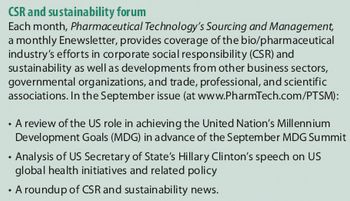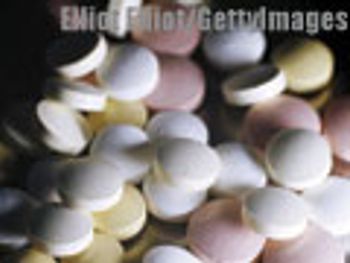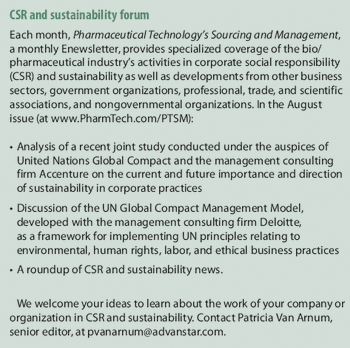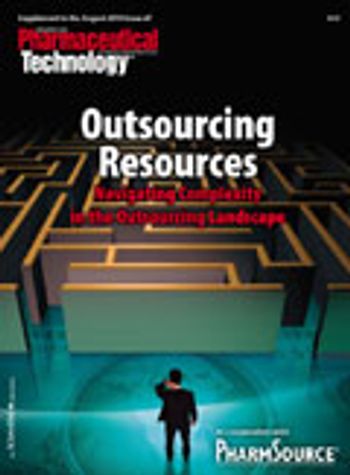
The growth of biologics is an important factor for the injectable-drug delivery systems market. A look at the technical and market considerations affecting this sector.
Patricia Van Arnum was executive editor of Pharmaceutical Technology.

The growth of biologics is an important factor for the injectable-drug delivery systems market. A look at the technical and market considerations affecting this sector.

Pfizer's acquisition of Wyeth involves augmenting its biopharmaceutical product portfolio, pipeline, and related development and manufacturing capabilities.

The European Medicines Agency and the US Food and Drug Administration announced their individual regulatory decisions and resulting actions regarding the marketing of GlaxoSmithKline's (London) Avandia (rosiglitazone), a thiazolidinedione used to treat Type 2 diabetes.

Johnson & Johnson (J&J, New Brunswick, NJ) announced last week that it was in "advanced negotiations" for a potential public offer for the Dutch biopharmaceutical company Crucell (Leiden, The Netherlands).

Bristol-Myers Squibb (New York) has agreed to acquire the biopharmaceutical company ZymoGenetics (Seattle) for an aggregate purchase price of $885 million or $735 million net of cash.

The generic-drug company Actavis (Hafnarfjordur, Iceland) is considering acquiring a 51% stake in the biopharmaceutical company BioPartners Holdings (Barr, Switzerland) from Bioton, a Polish biotechnology company.

The Society for Chemical Manufacturers and Affiliates (SOCMA) issued recommendations relating to disclosure of confidential business information (CBI) in response to Environmental Protection Agency's (EPA) decision to limit CBI claims on chemical identity under the Toxic Substances Control Act (TSCA).

Pharmaceutical Technology gains insight into approaches for producing aromatic amines.

The President's Council on Advisors on Science and Technology (PCAST), a group administered by the federal Office of Science and Technology Policy (OSTP), issued recommendations to improve the country's ability to accelerate vaccine production and delivery in the event of a pandemic flu outbreak.

An upcoming summit will assess the progress and gaps in realizing the UN Millennium Development Goals, including outcomes from global health initiatives.

Bristol-Myers Squibb's fit-for-purpose mode for clinical-trial materials for early-stage development seeks to achieve a better way in resource allocation. This article is part of a special issue on API Development, Formulation, Synthesis and Manufacturing.

Procurement, sourcing, and partnerships with external suppliers take on greater importance as the pharmaceutical supply chain becomes increasingly more complex and global.

Chemocatalytic and biocatalytic approaches in asymmetric synthesis help provide a pathway for producing single-enantiomer drugs.

Secretary of State Hillary Clinton details the progress and future direction of the US role in the Global Health Initiative.

US Department of Health and Human Services (HHS) Secretary Kathleen Sebelius released last week an examination of the federal government's system to produce medical countermeasures, or medications, vaccines, equipment, and supplies needed for a health emergency.

The Society of Chemical Manufacturers and Affiliates (SOCMA) welcomed the signing of HR 4380, the United States Manufacturing Enhancement Act of 2010, also known as the Miscellaneous Tariff Bill (MTB) into law (Public Law 111-227) by President Barack Obama on Aug. 11, 2010.

Sen. Michael Bennet (D-CO) introduced a bill earlier this month, the Drug Safety and Accountability Act of 2010, which is designed to improve regulatory oversight of drug-manufacturing facilities and improve related quality standards and monitoring.

Legislative efforts to modernize provisions in the Toxic Substances Control Act of 1976 (TSCA), which involve chemical safety and reporting requirements is drawing criticism from the chemical industry.

The Senate Appropriations Committee approved a measure last week that would restrict the use of certain patent settlements by innovator-drug companies under which innovator-drug companies pay generic-drug companies to delay the entry of a generic product in so-called "pay-for-delay" cases.

The UN Global Compact, a corporate-social-responsibility initiative, releases a management model to help businesses implement sustainability principles.

A recently released index based on feedback from more than 400 senior manufacturing executives provides perspectives on the current and future direction in global manufacturing competitiveness.

Increased outsourcing of clinical research in Asia is an important consideration in the pharmaceutical value chain.

A recently released study by Accenture shows that sustainability is becoming an increasingly important part of the strategies and operations of companies.

Pharmaceutical Technology's annual analysis of the pharmaceutical majors' activities shows a shrinking global manufacturing network amidst company restructuring, product intensification in biologics, and a strategic focus and push to emerging markets.

Chemocatalytic and biocatalytic approaches in asymmetric synthesis help provide a pathway for producing single-enantiomer drugs.

Green chemistry in pharmaceutical development often centers around approaches in the synthesis of the active ingredient, but green-chemistry techniques also can be applied to drug-product manufacturing, formulation development, and drug delivery.

As emerging markets become increasingly important for the pharmaceutical majors, companies are re-evaluating their outsourcing strategies. This article is part of the 2010 Outsourcing Resources special issue.

Leading CMOs share their experiences with regard to client expectations and performance indicators as well as strategies for adapting to the changing contract-manufacturing environment. This article is part of the 2010 Outsourcing Resources special issue.

The Society of Chemical Manufacturers and Affiliates (SOCMA) expressed "strong concern" over legislation introduced in the US Senate earlier this month regarding chemical-site security.

Merck & Co. (Whitehouse Station, NJ) released details of a restructuring plan last week, which calls for phasing out operations at eight research sites and eight manufacturing sites, resulting in a 15% reduction of its global workforce.